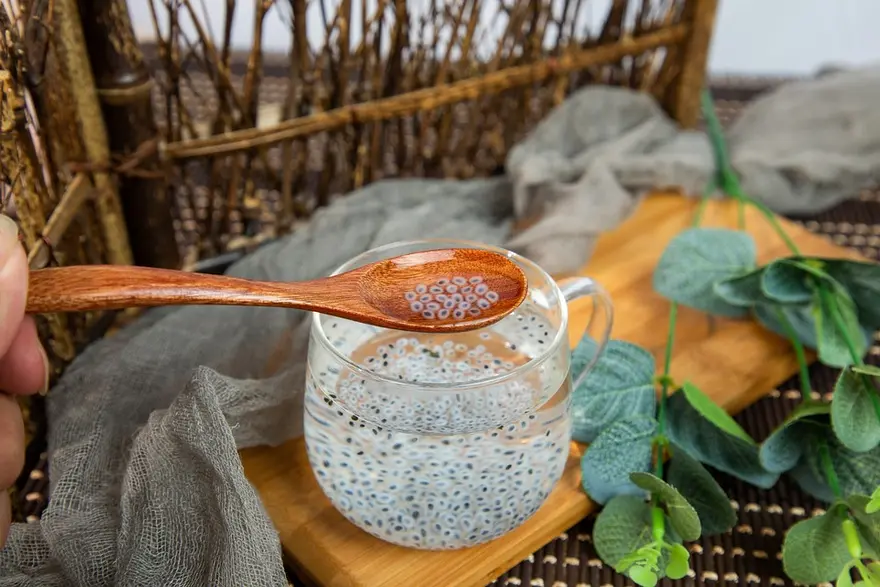Preventive Healthcare
Sabja Seeds: Nature's Health Booster for Hydration and Digestion
90077 Views
0

Introduction
If you're looking for a natural way to soothe indigestion, sabja seeds are the way to go! In this comprehensive guide, you will discover the numerous health benefits of sabja seeds. We'll discuss how to consume sabja seeds effectively so that you can reap their full benefits. We will also address some of the side effects of sabja seeds that can cause potential harm. Read on to know more!
What are Sabja Seeds?
Sabja seeds, also known as basil seeds or tukmaria, are tiny black seeds derived from the sweet basil plant. When soaked in water, these seeds swell up, forming a gelatinous coating around them. Packed with essential nutrients like fibre, protein, and antioxidants, they offer a range of health benefits.
What are the Nutrient Values of Sabja Seeds?
Studies indicate that the nutritional values of sabja seeds can vary based on their origin. In India, sabja seeds nutrition facts 100g include:
|
Nutritional components |
Amount |
|
Protein |
14.8g |
|
Lipid |
13.8 g |
|
Carbohydrates |
63.8 g |
|
Fibre |
22.6 g |
|
Iron |
2.27 mg |
|
Magnesium |
31.55 mg |
|
Zinc |
1.58 mg |
|
Calories |
442 |
10 Health Benefits of Sabja Seeds
Adding sabja seeds to your meals as part of a balanced diet can tremendously benefit your health. Given below are some important sabja seeds benefits:
Aids Digestion
The high fibre content of sabja seeds promotes smooth digestion, reduces bloating, and supports a healthy gut environment. Therefore, consuming sabja seeds can keep your digestive system running smoothly.
Weight Management
Sabja seeds for weight loss are an excellent choice because they promote a feeling of fullness due to their high fibre content. This can help in reducing your overall calorie intake. Moreover, they regulate your blood sugar levels, preventing spikes that can lead to cravings and overeating.
Hydration
Sabja seeds aid in hydration by absorbing water and forming a gel-like substance when soaked. This helps retain moisture in your body, keeping you hydrated for longer periods. Consuming foods or drinks containing sabja seeds can be particularly beneficial during hot weather or after exercise when proper hydration is required for your body.
Acts as a Natural Body Coolant
Sabja seeds act as a natural body coolant by reducing your body heat and providing relief from hot weather or fever. When consumed, sabja seeds have a cooling effect on your body, helping to regulate internal temperature and promote comfort.
Reduces Blood Sugar Levels
Sabja seeds help reduce blood sugar levels by slowing down the absorption of carbohydrates in your body. Their high fibre content slows the release of glucose into the bloodstream, preventing sudden spikes in blood sugar levels.
Good for Diabetes Management
By incorporating sabja seeds into your diet, you can support better blood sugar control and reduce the risk of complications associated with diabetes. Additionally, sabja seeds contain natural compounds that may improve insulin sensitivity. It allows cells to use glucose more efficiently as an energy source without increasing the risk of diabetes.
Relieves Constipation & Acidity
Sabja seeds provide relief from constipation and acidity by promoting smooth digestion. The gel-like substance that develops around sabja seeds when soaked, aids in bowel movement, easing constipation. Additionally, the seeds have a cooling effect on your digestive system, reducing acidity and providing relief from heartburn and indigestion.
Good For Skin
There are plenty of sabja seeds benefits for your skin health. Packed with antioxidants, they help combat free radicals that can damage your skin cells which causes premature ageing and dullness. Additionally, sabja seeds contain essential nutrients like vitamin E, that promote skin elasticity and hydration, leaving your skin appear youthful and radiant. Incorporating sabja seeds into your diet can also help detoxify your skin from within, reducing inflammation and promoting a clearer complexion.
Respiratory Health
The anti-inflammatory properties of sabja seeds help alleviate symptoms of respiratory conditions like asthma and bronchitis, reducing inflammation in your airways and easing breathing difficulties. Additionally, the seeds contain compounds that may help clear mucus and congestion, allowing for easier breathing.
Mental Wellness
Sabja seeds contribute to mental wellness by providing essential nutrients that support your brain function. Rich in omega-3 fatty acids, sabja seeds help reduce inflammation in your brain, which is linked to mood disorders like depression and anxiety. Moreover, sabja seeds contain nutrients like magnesium and zinc, which play key roles in neurotransmitter function, promoting feelings of calmness and reducing stress.
How To Consume Sabja Seeds?
To enjoy the sabja seeds benefits, start by soaking 1 tablespoon of sabja seeds in water for about 15-20 minutes until they swell up and form a gel-like coating. You can then add the soaked seeds to various dishes or beverages.
For a refreshing drink, mix the soaked sabja seeds with water, lemon juice, and a sweetener of your choice to make a flavourful basil seed drink. You can also add them to smoothies, yoghurt, or fruit salads for an extra nutritional boost.
In savoury dishes, sprinkle soaked sabja seeds over salads, soups, or curries to add texture and a subtle flavour. Additionally, you can incorporate them into desserts like puddings, ice creams, or falooda for a delightful twist.
Side Effects of Sabja Seeds
While sabja seeds offer various health benefits, it's essential to be aware of its potential side effects. Common sabja seeds side effects may include:
- Swallowing sabja seeds without soaking them properly can pose a choking hazard, particularly for children and older adults.
- You may experience allergic reactions which is one among many sabja seeds side effects, leading to symptoms like itching, hives, or difficulty breathing. You must start with small amounts when introducing sabja seeds into your diet and monitor your body's response.
- Sabja seeds may interact with certain medications, such as blood thinners or diabetes medications, so it's advisable to consult with a doctor before consuming them regularly, especially if you have underlying health conditions or are pregnant or breastfeeding.
- Sabja seeds side effects for females are notable as excessive consumption of sabja seeds may lead to hormonal imbalances in some women, affecting menstrual cycles.
Conclusion
In conclusion, there are a plethora of sabja seeds benefits, from aiding digestion to promoting hydration, regulating blood pressure and supporting mental wellness. However, you must consume them in moderation and be mindful of potential side effects. By incorporating sabja seeds into your diet sensibly, you can improve your health naturally. If you have diabetes, sabja seeds can play the role of a superfood for you. Meanwhile, you can book a quick HbA1C test with Metropolis Healthcare for prompt and accurate blood test reports that help you manage your condition more effectively. Our expert phlebotomists and at-home testing facilities ensure your diagnostic experience is second to none. Book your test today!























 WhatsApp
WhatsApp